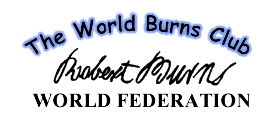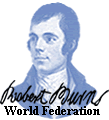|
Man Was Made To Mourn.
A Dirge.
1.
When chill November's surly blast
Made fields and forest bare,
One ev'ning, as I wand'red forth
Along the banks of Ayr,
I spied a man, whose aged step
Seem'd weary, worn with care,
His face was furrow'd o'er with years,
And hoary was his hair.
2.
'Young stranger, whither wand'rest thou?'
Began the rev'rend Sage,
'Does thirst of wealth thy step constrain,
Or youthful pleasure's rage?
Or haply, prest with cares and woes,
Too soon thou hast began
To wander forth, with me to mourn
The miseries of Man.
3.
The sun that overhangs yon moors,
Out-spreading far and wide,
Where hundreds labour to support
A haughty lordling's pride:
I've seen yon weary winter-sun
Twice forty times return;
And ev'ry time has added proofs,
That man was made to mourn.
4.
'O Man! while in thy early years,
How prodigal of time!
Mis-spending all thy precious hours,
Thy glorious, youthful prime!
Alternate follies take the sway,
Licentious passions burn:
Which tenfold force gives Nature's law,
That Man was made to mourn.
5.
Look not alone on youthful prime,
Or manhood's active might;
Man then is useful to his kind,
Supported is his right:
But see him on the edge of life,
With cares and sorrows worn;
Then Age and Want - O ill match'd pair! --
Shew Man was made to mourn.
6.
'A few seem favourites of Fate,
In Pleasure's lap carest;
Yet think not all the rich and great
Are likewise truly blest:
But oh! what crowds in ev'ry land,
All wretched and forlorn,
Thro' weary life this lesson learn,
That Man was made to mourn.
7.
'Many and sharp the num'rous ills
Inwoven with our frame!
More pointed still we make ourselves
Regret, remorse, and shame!
And Man, whose heav'n-erected face
The smiles of love adorn,--
Man's inhumanity to man
Makes countless thousands mourn!
8.
'See yonder poor, o'erlabour'd wight,
So abject, mean, and vile,
Who begs a brother of the earth
To give him leave to toil;
And see his lordly fellow-worm
The poor petition spurn,
Unmindful, tho' a weeping wife
And helpless offspring mourn.
9.
'If I'm design'd yon lordling's slave--
By Nature's law design'd--
Why was an independent wish
E'er planted in my mind?
If not, why am I subject to
His cruelty, or scorn?
Or why has Man the will and pow'r
To make his fellow mourn?
10.
'Yet let not this too much, my son,
Disturb thy youthful breast:
This partial view of human-kind
Is surely not the last!
The poor, oppressed, honest man,
Had never, sure, been born,
Had there not been some recompense
To comfort those that mourn!
11.
'O Death! the poor man's dearest friend,
The kindest and the best!
Welcome the hour my aged limbs
Are laid with thee at rest!
The great, the wealthy fear thy blow,
From pomp and pleasure torn,
But, oh! a blest relief to those
That weary-laden mourn!'
|
Man Was Made To Mourn.
A Dirge.
1.
When chill November's surly blast
Made fields and forest bare,
One evening, as I wandered forth
Along the banks of Ayr,
I spied a man, whose aged step
Seemed weary, worn with care,
His face was furrowed over with years,
And hoary (frosty) was his hair.
2.
'Young stranger, where are you wandering to?'
Began the reverend Sage,
'Does thirst of wealth thy step constrain,
Or youthful pleasure's rage?
Or haply, pressed with cares and woes,
Too soon you have begun
To wander forth, with me to mourn
The miseries of Man.
3.
The sun that overhangs yonder moors,
Out-spreading far and wide,
Where hundreds labour to support
A haughty lordling's pride:
I have seen that weary winter sun
Twice forty times return;
And every time has added proofs,
That man was made to mourn.
4.
'O Man! while in your thy early years,
How prodigal of time!
Mis-spending all thy precious hours,
Your glorious, youthful prime!
Alternate follies take the sway,
Licentious passions burn:
Which tenfold force gives Nature's law,
That Man was made to mourn.
5.
Look not alone on youthful prime,
Or manhood's active might;
Man then is useful to his kind,
Supported is his right:
But see him on the edge of life,
With cares and sorrows worn;
Then Age and Want - O ill matched pair! -
Show Man was made to mourn.
6.
'A few seem favourites of Fate,
In Pleasure's lap caressed;
Yet think not all the rich and great
Are likewise truly blessed:
But oh! what crowds in every land,
All wretched and forlorn,
Through weary life this lesson learn,
That Man was made to mourn.
7.
'Many and sharp the numerous ills
Inter-woven with our frame!
More pointed still we make ourselves
Regret, remorse, and shame!
And Man, whose heaven-erected face
The smiles of love adorn,--
Man's inhumanity to man
Makes countless thousands mourn!
8.
'See yonder poor, over-laboured sturdy person,
So abject, mean, and vile,
Who begs a brother of the earth
To give him leave to toil;
And see his lordly fellow-worm
The poor petition spurn,
Unmindful, though a weeping wife
And helpless offspring mourn.
9.
'If I am designed yonder lordling's slave-
By Nature's law designed-
Why was an independent wish
Ever planted in my mind?
If not, why am I subject to
His cruelty, or scorn?
Or why has Man the will and power
To make his fellow mourn?
10.
'Yet let not this too much, my son,
Disturb your youthful breast:
This partial view of human-kind
Is surely not the last!
The poor, oppressed, honest man,
Had never, sure, been born,
Had there not been some recompense
To comfort those that mourn!
11.
'O Death! the poor man's dearest friend,
The kindest and the best!
Welcome the hour my aged limbs
Are laid with you at rest!
The great, the wealthy fear your blow,
From pomp and pleasure torn,
But, oh! a blessed relief to those
That weary laden mourn!'
|





